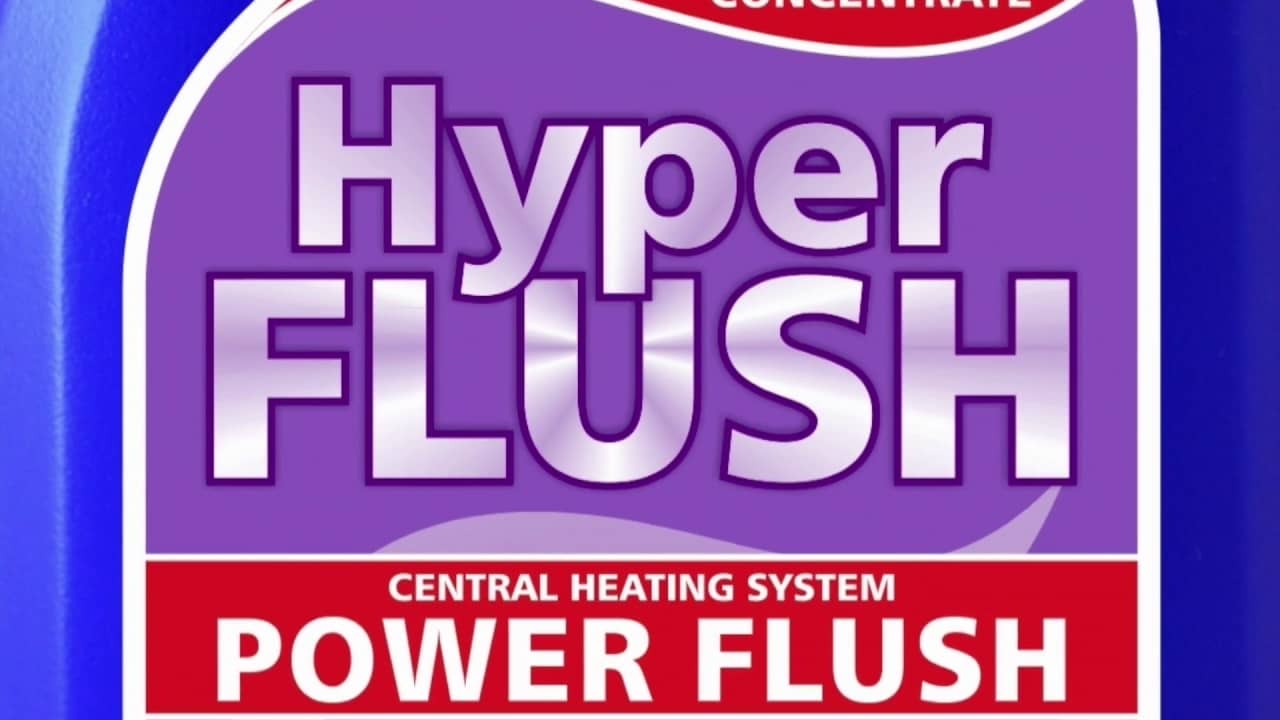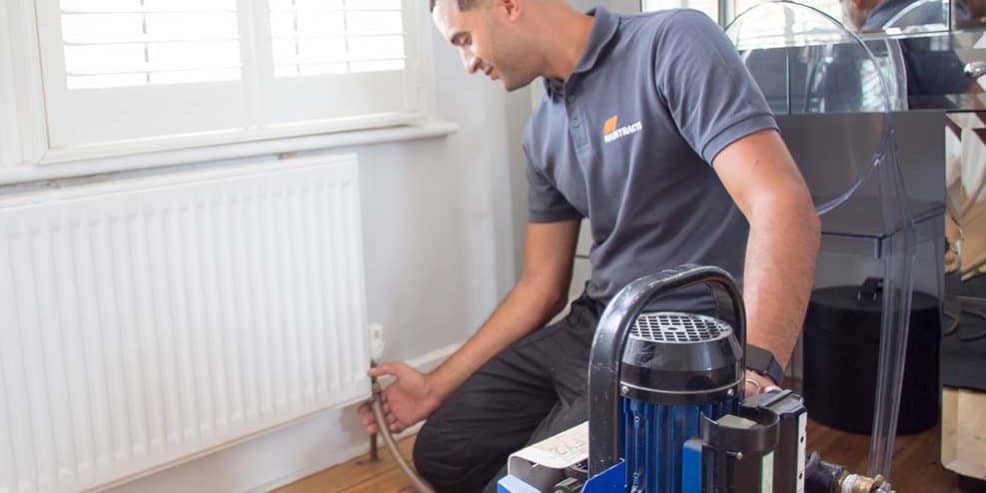Powerflushing is the most effective way of removing the sludge, debris, and rust that builds up in your central system over time. By removing the accumulation of material that builds up in the pipework over the years, you will not only extend the life of your heating system, but you will also ensure it works as efficiently as it can to heat up your home.
Maintracts Heating Engineer Daniel Tong explains everything you need to know about powerflushing a heating system…

Think about powerflushing as dialysis for a heating system. Just as dialysis removes waste products and excess fluid from the blood when the kidneys stop working properly, powerflushing removes all the iron oxide deposits and other debris from the radiator system and replenishes it with clean water. We use chemicals at the same time to accelerate the process and to treat the water in the system to help reduce corrosion in the future.
Why you may need a powerflush
Some heating issues are not always obvious. A powerflush will help solve heating issues that you may not notice until the issue has escalated into a bigger problem. The overall aim is to help the heating system perform as efficiently as possible and to prevent boiler breakdowns from occurring.
Cold spots on your radiators
Have you ever felt cold spots on your radiators or noticed that the radiator is cold along the bottom and hot at the top? This is a good indication that the radiator is partially blocked with iron oxide sludge. If you’ve tried bleeding the radiator with no success, then flushing the central heating system will likely be your next port of call to effectively remove all that debris and dirty water, replenish the system with clean water, and restore proper circulation. If the problem is confined to one radiator, then we could remove this radiator and flush it through on its own, but if a few or all of your radiators are not heating up very well and have cold spots, then we would recommend flushing the whole system.
Your rooms aren’t as warm as they used to be
If saving energy is a priority in your household, you will want to know that rust, sludge, and dirty water in your heating system can lead to leaks and blockages which can result in a problematic and inefficient installation. If your boiler and radiators are having to work harder to heat the rooms in your house, you’ll waste more energy. Think of the money you’ll be throwing down the drain on energy bills too – most of us are comfortable firing up the boiler if it's going to mean warm, toasty rooms, but if you are firing it up and your radiators are not heating to their full capacity, then the heating system will need to run for much longer before the rooms reach your desired temperature.
Improve the longevity of your new boiler
Modern boilers are much more susceptible to the effects of a dirty heating system. 87% of breakdowns affecting modern boilers/heating systems are in some way related to dirty water in the heating system. If you install a new boiler within a system that is full of dirt, sludge, and rust, then this is likely to result in problems occurring prematurely and the life expectancy of the boiler being reduced. Ensuring that the heating system is cleaned beforehand should extend the lifespan of your new boiler.
How often do I need to powerflush my heating system?
Maintracts heating engineers recommend flushing a central heating system when installing a new boiler to ensure the system is clean from the get-go. It is commonplace now for manufacturers to offer 10-year manufacturer warranties, on the condition that the heating system is kept clean. Nowadays, new boilers for an average household will last up to 10-15 years, so the 10-year mark is a good time to think about having your central heating system flushed again.
How long does powerflushing take?
Typically, our heating engineers will spend a whole day or longer at a property powerflushing a central heating system. This ensures plenty of time is allocated for the job to be conducted properly and safely.
Can you powerflush any heating system?
The simple answer is yes, we are able to powerflush all heating systems. However, we will tailor our method according to the type and age of system you have. For example. If you have an old, non-pressurised system with very, very old pipework, we may avoid putting high pressure water through it in case a connection or pipe fails below the floor and causes a leak. In this scenario, we would conduct a manual flush either without machinery or using Thoroughflush equipment which operates using mains water pressure.
We also recommend the installation of a magnetic filter to collect and trap any magnetic material. Iron oxide is the by-product of water reacting with the steel and copper components within the system. The oxide created appears in the form of sludge deposits which can clog up and damage the system and its associated components. It also affects the system’s efficiency and lifespan.
Whether a manual or a machine powered flush is conducted, the central heating system will be treated with specialist chemicals to aid the cleansing process. An effective powerflush should remove more than 90% of the iron oxide deposits which have formed in a heating system. We use a rubber mallet or an SDS drill with a special attachment to agitate the deposits in the radiators and improve the efficiency of the process.
How much does a powerflush cost?
Typically, a powerflush costs between £900 to £2000 plus VAT for a domestic heating system, subject to the type of installation and number of radiators.

How to flush a central heating system
Kamco is the UK’s leading manufacturer of powerflushing machines and associated chemicals, including the Clearflow pumps that we use here at Maintracts Services for all our powerflushing jobs. The following video shows how to powerflush a domestic central heating system with the Clearflow CF40 pump.
How to book a powerflush
Powerflushing with Maintracts Services, could not be easier to arrange. We don’t have call centres; you can simply call 020 8131 1866 to speak directly to a member of our professional heating team. We will arrange for one of our heating engineers to come out and check your central heating system, then provide a quote.
If you decide to go ahead with a powerflush, we’ll book you in for an appointment (in a typical 3-to-4-bedroom property it can take around 6-8 hours to complete a powerflush properly).
If you are considering a powerflush to help protect your boiler from breakdown, prolong the life of your heating system, or ensure your home is heating up efficiently and wasting less energy – don’t hesitate to contact us today.

